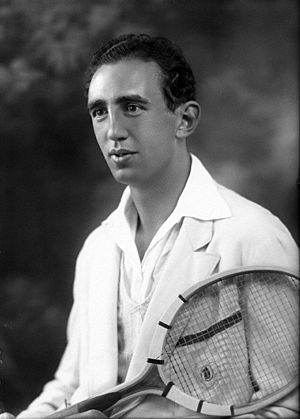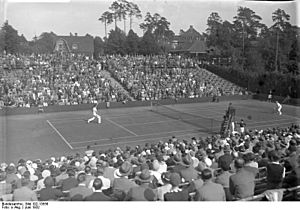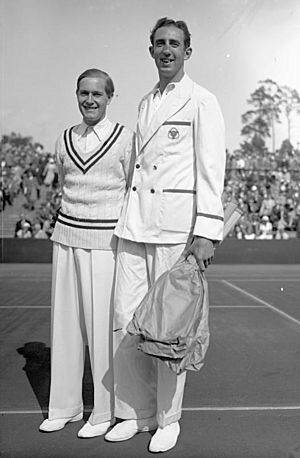George Lyttleton Rogers facts for kids
 |
|
| Country (sports) | |
|---|---|
| Born | 10 July 1906 Athy, Ireland |
| Died | 19 November 1962 (aged 56) Los Angeles, United States |
| Height | 2.01 m (6 ft 7 in) |
| Turned pro | 1926 (amateur tour) 1945 (pro tour) |
| Plays | Right-handed |
| Singles | |
| Career record | 537-224 (70.5%) |
| Career titles | 39 |
| Grand Slam singles results | |
| French Open | QF (1930, 1932) |
| Wimbledon | 4R (1933) |
| US Open | 4R (1930) |
| Professional majors | |
| US Pro | 3R (1945) |
| Doubles | |
| Highest ranking | No. 1 (1947) |
| Grand Slam doubles results | |
| French Open | 2R (1930) |
| Wimbledon | QF (1935) |
| Team competitions | |
| Davis Cup | SFEu (1936) |
George Lyttleton Rogers (born July 10, 1906 – died November 19, 1962) was an amazing Irish tennis player. He was also a coach and helped promote tennis. George was a champion many times! He won the Irish Championships three times (in 1926, 1936, and 1937). He also became the champion of Canada and Argentina. He reached the finals of the Monte Carlo Cup three times. In 1931, he was ranked as the 11th best player in France.
Contents
Early Life and Family Background
George Lyttleton Rogers was born on July 10, 1906, in Athy, County Kildare, Ireland. His parents were Francis William Lyttelton Rogers and Hessie May Lloyd Sherrie Rogers. His aunt, Alice Upton Harvey, was a well-known Irish music composer. His cousin, George U. Harvey, was a leader in Queens, New York, from 1929 to 1941. George studied at the Imperial Service College in Windsor, England.
Amateur Tennis Career Highlights
George Rogers had a very active amateur tennis career, playing in many tournaments around the world.
Successes in 1930
In 1930, George had a fantastic year, winning 18 international titles! He reached several finals, including the Beausite tournament in Cannes and the Monaco tournament, where he played against the famous Bill Tilden. He also won the doubles title with Tamio Abe at the Beaumont Trophy in Monte Carlo.
A big win for George in 1930 was the Canadian Lawn Tennis National Championships. He beat Gilbert Nunns in four sets to become the champion.
Achievements in 1931
George started 1931 by winning the Beausite–L.T.C. de Cannes Championship. He also won the mixed doubles title with Elizabeth Ryan at the Beausite tournament. At the Parc Imperial L.T.C. de Nice, he won the singles title easily.
In February, George won the Beaulieu Championships again, beating Emmanuel du Plaix. He also won the Menton tournament with his partner, Hungarian player Béla von Kehrling. In Bordighera, he won the singles final against Kehrling in a very close match. He also won the doubles title there.
In March, George won both singles and doubles titles at the L.T.C. de Cannes. By December 1931, the French tennis rankings placed George as the 11th best player in France.
Playing in 1932
George continued his winning streak in 1932. He successfully defended his title at the Beausite tournament. At the New Courts L.T.C. de Cannes, he won both the singles and doubles titles after tough matches. He even achieved a "triple crown" at the Carlton Club, winning singles and both doubles events.
He reached the final of the Monte Carlo Cup for the second time but lost to Roderich Menzel. In August, he became the champion of North of England, and a month later, he won the South of England title too.
Later Amateur Years
In 1933, George won the doubles trophy at the Club Carlton in Cannes. He also reached the Monte-Carlo final for the third time, but lost to Bunny Austin. In 1934, he won the Northern tournament championships. He also won the doubles title there with Cam Malfroy.
In 1937, George's first-round match at the 1937 Wimbledon Championships was a special event. It was the first tennis match ever shown on television in Great Britain! He won his second Manchester title later that year. In 1938, he became the Bournemouth hard court doubles champion.
George played for the Irish Davis Cup team from 1929 to 1939. He played 49 matches and won 24 of them. The Irish team reached the semifinals of the Europe zone in 1936.
Tennis During World War II
During World War II, George lived in the United States. He continued to play in the U.S. National Championships from 1940 to 1942. In 1940, he reached the semifinals of the New York State Clay Court Tennis championship.
George also used his tennis skills to help others during the war. In 1942, he organized tennis shows to raise money for the Red Cross. In 1945, he played exhibition matches to support the United States Army by encouraging people to buy war bonds. He turned professional in March 1945.
Professional Tennis Career
After turning pro in 1945, George Lyttleton Rogers became the president of the World Pro Tennis Association (WPTA). He also continued to play professionally. In 1947, he became the World Pro doubles champion with his partner Frank Kovacs.
George continued to play tennis even as a senior. He competed in the Eastern Senior Tournament in 1957.
George's Playing Style
George Lyttleton Rogers was known for being very tall for a tennis player at 2.01 meters (about 6 feet 7 inches). He used his height to his advantage. He was a "baseliner," meaning he preferred to play from the back of the court. He hit the ball flat and had a very fast first serve. His forehand was strong, and his overhead smashes were excellent. In doubles, he had an unusual way of positioning himself on the court.
Personal Life
Besides tennis, George Rogers was also an amateur boxer. He even trained with a famous boxer named Don McCorkindale. George also coached younger tennis players, helping them improve their game.
George married three times. His third marriage was in 1951 to June Sears of California. They settled in Los Angeles, where George passed away in 1962 at the Los Angeles County General Hospital.
Images for kids




